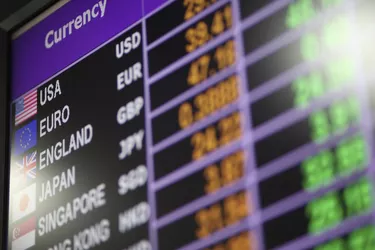
All investing in foreign currencies should be done within the context of your long-term investment goals, with an aim toward decreasing systematic risk by further diversifying into other asset classes. Foreign currency can make an attractive investment, because as a highly liquid asset, it serves as a safety net for your portfolio. It can simultaneously serve as a reserve, which can quickly be converted and re-invested in the event of an economic crisis or, conversely, a market opportunity.
Foreign Exchange Dealers
Video of the Day
One of the benefits of investing in foreign exchange is its liquidity. The foreign exchange market is the largest financial market in the world, with average daily trading volume of $3.2 trillion in 2014. You can purchase any amount of a foreign currency from foreign exchange dealers -- typically large, multinational financial firms such as commercial banks. Since there is no centralized market for global currencies, the forex market is accessible 24 hours a day. Transaction costs are very low. You pay no commissions on foreign exchange investments, but incur transactions costs via a tiny bid-ask spread.
Video of the Day
Derivatives
Derivatives are securities whose values are derived from price movements in underlying assets. Futures are the main derivatives used to invest in foreign currencies. They are short-term contracts to buy or sell a given currency at a specific price. Their liquid nature and the dynamics of the forex market make futures conducive for active trading. For example, using standard futures contracts that trade on the Chicago Mercantile Exchange, you can take a long position by buying 100 contracts of British pounds, each contract holding 62,500 pounds at the market rate, also known as spot rate, of 0.62375. If the pound rises, you can close out this long position by selling the same number of contracts. If you close out the transaction when the pound has risen to 0.6238, your profit is equal to: 100 contracts multiplied by 62,500 pounds per contract, multiplied by the 0.00005 price increase, or 312.5 pounds.
Exchange-Traded Funds
Exchange-traded funds allow you to invest in a specific foreign currency or even a basket of currencies. ETFs have greatly expanded the investing world by providing low-cost vehicles for investing in virtually any sector of the capital markets. They are liquid, which is an advantage, because they trade on public exchanges just as publicly traded stocks do. You can invest in a currency ETF that tracks the performance of any foreign currency. If you expect the price of the pound to increase, you can purchase ETFs that move in tandem with the pound's performance, using the same brokerage account you would use to trade stocks. If you are a small business owner selling widgets in Mexico, you can purchase inverse ETFs that increase in value in proportion to decreases in the peso's value. This could offset decreases in revenues attributable to currency swings.
Currency Trading Platform
A relatively recent innovation is the online currency trading platform, where you can trade currencies continuously without the use of derivatives. R.J. O'Brien & Associates were early innovators in the field, later joined by companies such as DirectFX and FXCM. These companies act as their own clearinghouse, maintaining liquidity and essentially replicating the currency market on your desktop. These platforms are user-friendly, making currency trading simple. Since no derivatives are involved, you can invest as much or as little as you choose, and simply buy and sell any currency via the platform.